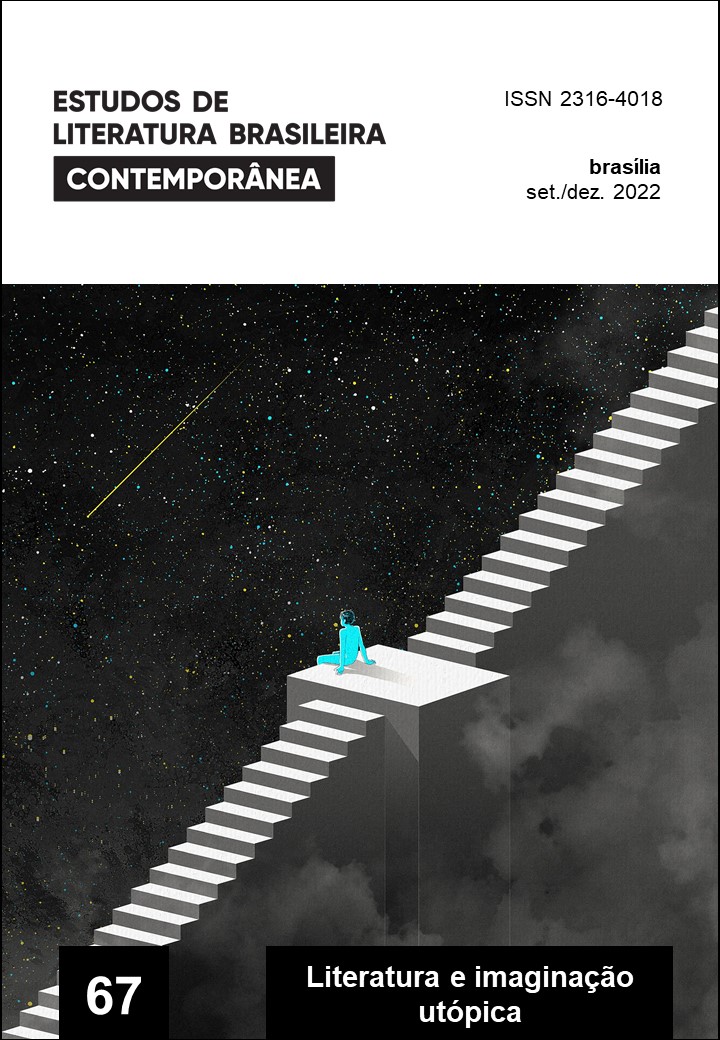“Grandma, are you a lesbian?” Point-blank question and answers for the constitution of a utopia
Keywords:
utopia; lesbianism; silence; traditionAbstract
What is it like to be a lesbian? The book Amora, by Natalia Borges Polesso (2018), although it circulates the subject, avoids a direct answer, but presents some affections densities and modulations of secret love, which are clues to the invisibility of lesbian affection. To invest in the theme, we will focus on the short story Vó, a senhora é lésbica? (Grandma, are you a lesbian?), dialoguing with Monique Wittig and other authors who proposed a lesbian utopia, using the literary text itself as a self-reflective resource. The writer’s effort in the short story is to break with the tradition of silencing and to propose an opening of topics for discussion within the family in order to break through heterosexual oppression.
Downloads
References
AUSTIN, John (1975). How to do things with words Massachusetts: Harvard University Press.
BACON, Francis. La nueva Atlantica Ebooket. Disponível em: https://biblioteca.org.ar/libros/130891.pdf Acesso em: 20 maio 2018.
» https://biblioteca.org.ar/libros/130891.pdf
BEAUVOIR, Simone de (2020). O segundo sexo Rio de Janeiro: Nova Fronteira.
BENJAMIN, Walter (1994). Magia e técnica, arte e política São Paulo: Brasiliense. (Obras escolhidas.)
CAMPANELLA, Tomaso (2001). Cidade do sol Rio de Janeiro: Vozes de Bolso.
FERREIRA, Maria Helena (2017). Utopias e distopias feministas: futuros alternativos e novas tecnologias reprodutivas. Rua-L, n. 6, p. 117-138. https://doi.org/10.34624/rual.v0i6.3076
» https://doi.org/10.34624/rual.v0i6.3076
FOUCAULT, Michel (2012). Em defesa da sociedade São Paulo: Martins Fontes.
FOUCAULT, Michel (2020). História da sexualidade São Paulo: Paz e Terra. v. 4.
GEARHART, Sally Miller (1984). Future visions: today’s politics: feminist utopias in review. In: ROHRLICH, Ruby; BARUCH, Elaine Hoffman (org.). Women in search of utopia: mavericks and mythmakers Nova York: Schocken Books, 1984. p. 296-309.
GILMAN, Charlotte Perkins (1970). Herland Nova York: Pantheon Books.
IONTA, Marilda (2017). Das amizades femininas e feministas. In: GALLO, Sílvio; RAGO, Margareth (org.). Michel Foucault e as insurreições São Paulo: CNPq, Capes, Fapesp, Intermeios. p. 375-386.
JEROME, Jerome K. (2022). A nova utopia São Paulo: Literatura Descoberta.
KAFKA, Franz (1997). A metamorfose São Paulo: Companhia das Letras.
LANE, Mary E. Bradley (2000). Mizora: a prophecy. Syracuse/Nova York: Syracuse University Press.
MACHADO, Roberto (2009). Deleuze, a arte e a filosofia Rio de Janeiro: Zahar.
MOORE, Thomas (1988). A utopia São Paulo: Nova Cultural.
MOTTA, Waldo (1997). Salário da loucura Vitória: Edição Artesanal.
NASCIMENTO, Tatiana (2019). Cuirlombismo literário São Paulo: n-1 edições.
POLESSO, Natalia Borges (2018). Amora Porto Alegre: Apple Books.
RICOEUR, Paul (2012). Tempo e narrativa São Paulo: Martins Fontes.
RUBIN, Gayle (1993). O tráfico de mulheres: notas sobre a economia política dos sexos. Recife: Edição SOS Corpo.
SPINOZA, Benedictus de (2007). Ética Belo Horizonte: Autêntica.
VIVA BEM UOL. Cientistas criam embriões sem espermatozoides, óvulos ou fertilização. Viva Bem UoL, 2022. Disponível em: https://www.uol.com.br/vivabem/noticias/afp/2022/08/05/cientistas-criam-embrioes-sem-espermatozoides-ovulos-ou-fertilizacao.htm?cmpid=copiaecola Acesso em: 15 ago. 2022.
WILDE, Oscar (2003). A alma do homem sob o socialismo Porto Alegre: L&PM.
WITTIG, Monique (2022). O pensamento heterossexual Belo Horizonte: Autêntica.
ZELDIN, Theodore (2008). Uma história íntima da humanidade São Paulo: Best Seller.
Downloads
Published
How to Cite
Issue
Section
License

This work is licensed under a Creative Commons Attribution-NoDerivatives 4.0 International License.
Authors who publish in this journal agree to the following terms:
a) The authors maintain the copyright and grant the journal the right of first publication, the work being simultaneously licensed under the Creative Commons Attribution License-Non Commercial 4.0 which allows the sharing of the work with acknowledgment of the authorship of the work and publication this journal.
b) Authors are authorized to enter into additional contracts separately, for non-exclusive distribution of the version of the work published in this journal (eg publish in institutional repository or as a book chapter), with authorship recognition and publication in this journal.
c) Authors are allowed and encouraged to publish and distribute their work online (eg in institutional repositories or on their personal page) after the editorial process, as this can generate productive changes, as well as increase the impact and citation of published work (See The Effect of Free Access).
d) The authors of the approved works authorize the magazine to, after publication, transfer its content for reproduction in content crawlers, virtual libraries and the like.
e) The authors assume that the texts submitted to the publication are of their original creation, being fully responsible for their content in the event of possible opposition by third parties.


